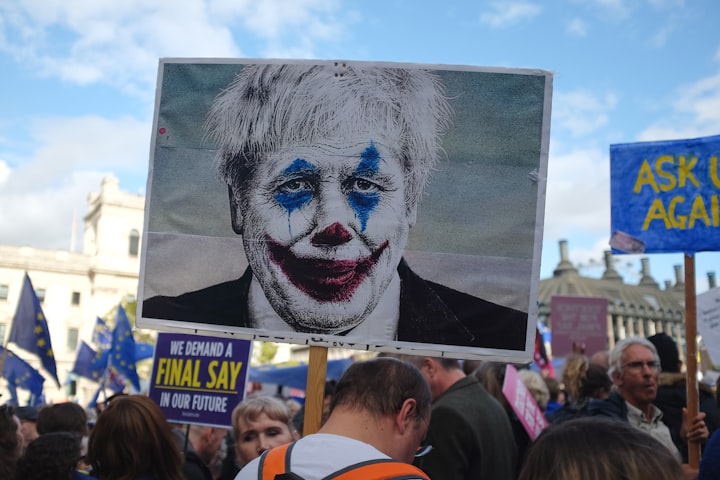An Important Question: Is This a Racist Country?
The fact that a man who died nearly 300 years ago is today on the front pages of all British newspapers suggests that Bristol has not been brilliant at coming to terms with its history.

"Do you really think that we are racist in this country?"
And, pretending I never had anyone asking that question before, I say:

"What do you mean?"
So he went on saying: "Do you think this is a racist country? Be honest, have you ever experience racism in this country? Because I never see it".
And me again: "Why are you asking me? I am not back or brown. And neither are you". "So, I am not sure how we could have experienced it?"
Some black people sometimes seem to be too sensitive.
Really?
We have this new girl working with us. We all had a brief chat on Skype. You know to put a face to a name now that we all work from home.
That's a good idea.

Yes, and she came across very well. I was impressed. She is black. Very pretty.
She is also very "well-spoken" and "articulate".
Oh, excellent.
Yeah. I was impressed. And I said that to her.
No, you didn't.
Of course, I did. I was in shock. Honestly, she speaks like the Queen. It's a compliment.
Okay. And what did she say to you?

Well, she seemed offended. The smiley look on her face changed and asked for the reason why I was so surprised.
Unbelievable. "I didn't mean it like that!"
Really? How did you mean it? Have you ever patted a white colleague on the back for knowing how to speak in full sentences? No? Okay.

Sometimes, people get defensive.
This is the point when they bring up that Black friend they have, using them as proof that "I'm not racist."
I guarantee you that the chance of you socialising with Black people does not do much in taking the sting away.
Being able to live a life without having to be defined by your skin colour is the hallmark of privilege.
It is much easier to recognise racism when it's Original Style. But when it takes a different form that isn't racist slur or hate speech slammed on someone's face, we often don't notice it, want to accept it or realise how much it affects the lives of others. Some of us think that because the motives are not malicious, they clearly cannot harbour prejudices or be racist.
Some well-meaning peoples think that if we stopped talking about it, it would disappear.
The smell of an errant fart is the best analogy here. Like a fart, to be polite, we try and ignore it, but it doesn't mean people don't know it's there.
Avoiding the problem doesn't solve it.
For most life issues, not addressing them only makes things worse. It's like saying to someone who complains about a broken leg after we pushed them down the stairs: "It doesn't heal because of you saying it hurts." We refuse to make an effort to provide the cast. And, that is why we must talk openly about race.
As some lament of the culture that privileges white people over people of colour, allowed by the system, encouraged and state-sanctioned, the pushback that usually comes up is: not all white people are racist.
No one says every white person is racist, but racism is real, bigots are many, and this is not made up to make any of us feel bad.
What we need to understand is that being white gives an automatic status of privilege because of our skin colour in a more general racist society.
Also, the well-meaning phrase: "I have Black friends" helps it remain unmovable. We fail to see the part we play in the system because too busy making sure everyone knows we are not racists.
Loving Beyoncé and Stevie Wonder or listening to Black music does not provide anyone with a free pass out of this system of structural racism.
The fact that I enjoy a salad from time to time doesn't make me a vegetarian.
We need to recognise that some of us had a head start and aren't just flourishing on our strength alone.
That is a privilege. So let's talk about it.
Privilege is accusatory as a word for many people. They feel attacked (or insulted) by the thought of having it. In reality, it's not about you or me; it's about our real sustained white privilege. Our privileges, that move us ahead from the famous starting line, are not within our control. Admitting it does not mean admitting doing something that contributes to someone else's oppression or marginalisation on purpose.
It means to acknowledge some part of your identity is putting you in a stronger place than others. It recognise something about you that is helping your life race progress. It also means whatever majority group you belong to, has probably contributed to another's oppression.
Knowing our privileges doesn't make us villains.
It should make us more thoughtful; it should humble us. We need to recognise that some of us aren't just flourishing on our strength alone.
A very obvious aspect of white privilege is that when someone is labelled neutrally — without indicating ethnicity or colour, people will assume that the person is white. That assumption suggests an uncomfortable fact: whiteness, in our society, determines humanity.
Unfortunately, people are so ill-equipped to deal with race that some are not only unwilling to see their privilege, they're reluctant even to admit that we're all different colours.
The point of pretending to be "colourblind" is not to ignore what's there; it's to show, that because of that we don't see people as less-than. But groups and categories aren't wrong in themselves. What's wrong are the degradation and stereotypes that come with some of the categories we are part.
Saying we don't see race is like saying there is nothing to fix.
"Colourblindness" and cultural eradication aid continue this system of oppression because imposed politeness and fear of the "race card" trump important work and progress.
I'm not sure what is worst between "I Don't See Color" and "Let Me Honour You by Painting My Face Black for Halloween." One believes they're commendable for not accepting racial diversity, and the other believes that being represented by face paint should make anyone feel honoured.
Why do you need to stop painting yourself black, red, brown or yellow (including trying to copy people accents) for a laugh?
Because it's what good people do. They care about the feelings of hurt and pain of others, attached to ages of denigration, genocide, slavery and diseases.
So, let's make some real friendships with someone who doesn't look like us. Let's stop saying we don't see colour and recognise our privilege. And try and make sure our friends and family do too.
About the Creator
Anton Black
I write about politics, society and the city where I live: London in the UK.






Comments
There are no comments for this story
Be the first to respond and start the conversation.